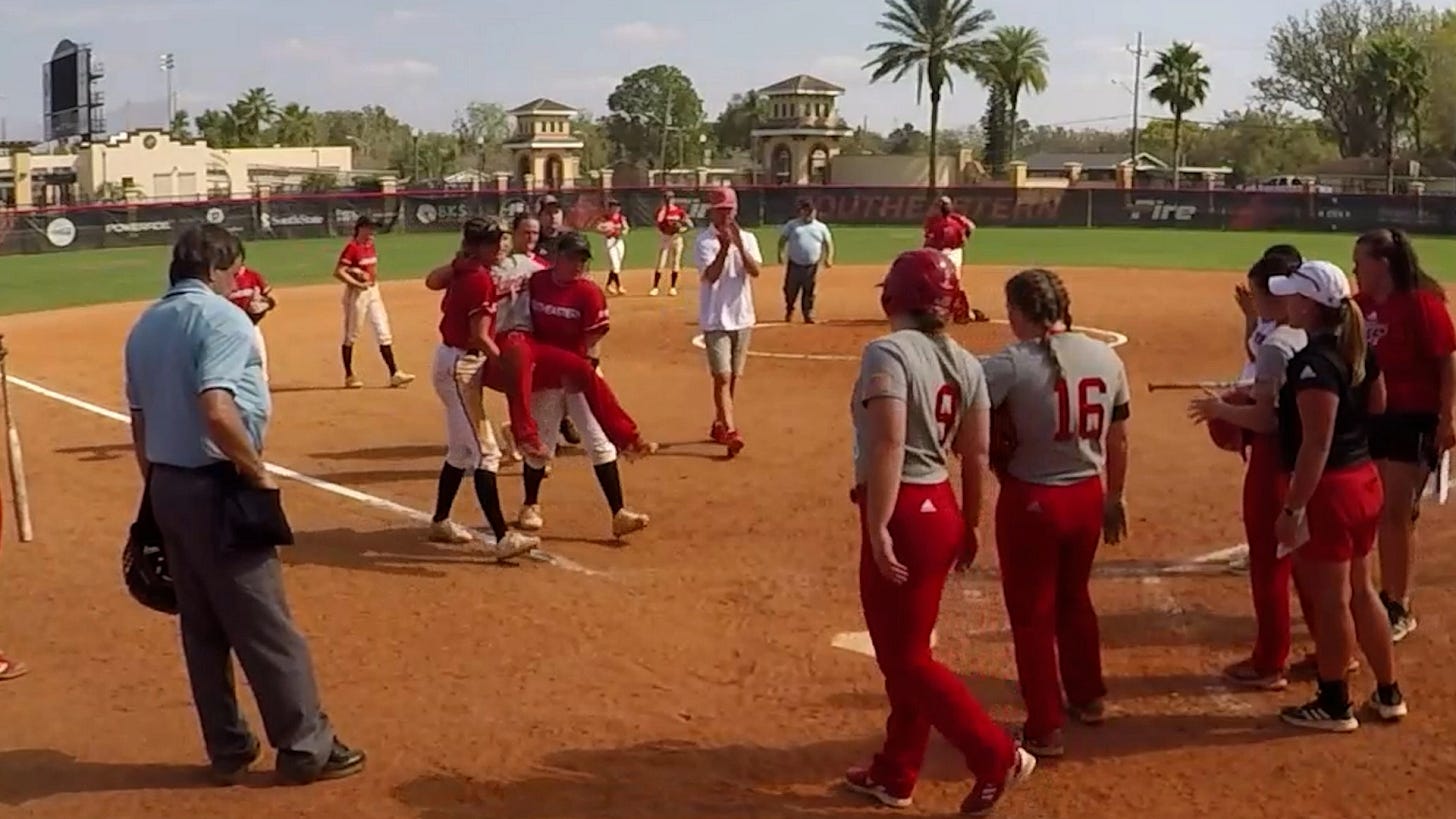A Home Run Trot Unlike Any Other
A moment in a college softball game reminded us of the power of sportsmanship
There are few feelings in sports quite like the home run trot. You’ve just put your team ahead, and now, the time is all yours—your moment to pause and admire your handiwork, your opportunity to celebrate, your chance to make sure your opponent knows they couldn’t get you out.
Last weekend, Grand View University catcher Kaitlyn Moss watched her ball sail over the fence and started on a home run trot that must have felt extra special. Her team, playing in the lower-level college league known as the NAIA, trailed the fourth-ranked team from Southeastern University 4-1. When Moss stepped up, the bases were loaded, and with one swing, her grand slam gave her underdog side a surprise lead in the top of the 5th.
Moss rounded first as her teammates cheered, and then…a stumble, a trip, an injured leg. Suddenly, Moss writhed in pain in the middle of the basepaths and the cheers came to a sudden stop. Not only was Moss injured, but if she couldn’t touch any of the bases, the home run wouldn’t count. All four runs would be wiped off the board.
And to make things even trickier, if a Grand View coach or teammate touched Moss before she tagged home—even to help her with her injury, it would be an automatic out. The rest of her team watched from home plate and in the dugout, and Moss looked back, helpless.
That’s when two players on the opposing team, Leah Gonzalez and Chapel Cunningham sprang into action. According to the rulebook, they could assist Moss and the runs would still be awarded. So, they lifted Moss and carried her, slowly lowering her to tap second base, then third, and finally as they rounded home, the cheers grew. Both teams clapped, as did the fans, as Gonzalez and Cunningham lowered Moss one last time to complete a home run trot unlike any other. Moss touched home, then gave her two opponents a hug and thanked them.
“Girl, don’t you worry,” Gonzalez replied. “You deserved that. You hit the ball, injuries happen. We’re here for you.”
Moss’s teammates helped her back into the dugout, and then they hung on to win 7-4, completing a comeback that never could have happened without the grand slam.
When asked about the gesture after the game, Cunningham dismissed any notion that what she had done was extraordinary. “I just knew it was the right thing to do,” Cunningham said. “Here at Southeastern they teach us, especially on our team, they try to tell us to do the thing that ought to be done, and I knew that that was what we should do. So, we didn’t really think twice.”
It was a move that deserved a moment to pause and celebrate it. The only thing that would have made this trip around the bases any better is if it could have had a home run trot of its own.
🎙️ ICYMI, episode two of our new narrative podcast Roughhousing is out now. Don’t miss it.
🏒 At 52 years old, NHL legend Jaomir Jagr still plays for his hometown professional Czech hockey team. “I think he could play until he’s 65,” says one local reporter. The Times sent David Waldstein to the town of Kladno to talk to Jagr and understand why he still laces on his skates every dayx. “I would never have been a hockey player if it was not for this town and this club,” Jagr said. “I would be a totally different person. This club and this city made my life. It’s my responsibility to give it back.”
🏀 Sticking in Eastern Europe, The Ringer’s Jordan Ritter Conn traveled to the Balkans to figure out why such a small area keeps producing the best players in the NBA. It’s a great read.
⚽ The MLS is back! And paying special attention to the league are superfans in…England?
😮 Allow the New Yorker to introduce you to Jessie Diggins, America’s first world champion in the toughest sport in the world.
🏄♂️ I loved this interview of Kelly Slater from Dax Shephard and Armchair Expert. Slater is one of the most thoughtful athletes around today—and it reminded me why his episode of our series Greatness Code remains my favorite.







